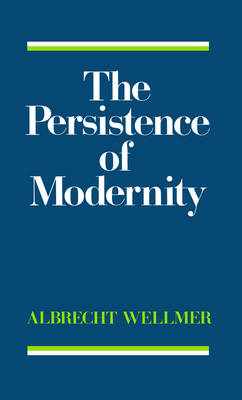Studies in Contemporary German Social Thought
2 total works
A common theme of this set of 13 essays by one of the major figures in late 20th-century German philosophies is the idea of a postmetaphysical modernity. In his preface Albrecht Wellmer relates the title of this book, "Endgames", to this common theme: the historical utopias and programs of ultimate justification are endgames within metaphysics, the deconstruction of those utopias and programs of ultimate justification are endgames played with metaphysics, and the game with an end as ultimate telos - the end(s) of history, the end(s) of knowledge, the end(s) of human life - is metaphysics. The title "Endgames", finally also refers polemically to postmodernist games with an end of modernity; as opposed to these, Wellmer defends the fragile moral and political substance of the modernity that postmodernists attempt to overcome - having a sense of what needs to preserved of the modern tradition for postmetaphysical modernity. In the first of the book's three parts, "Negative and Communicative Freedom", Wellmer focuses on political philosophy, examining in particular the links and tensions between liberal basic rights and modern ideas of democracy.
In Part II, "Postmetaphysical Perspectives", he attempts to develop a postmetaphysical perspective on aesthetics and metaphysics (with and against Adorno), on the problem of truth (with and against Richard Rorty, Jurgen Habermas, and Karl-Otto Apel), and on hermeneutics (with and against Hans-Georg Gadamer and Karl-Otto Apel). Part III, "Images of the Times", contains occasional pieces on Ludwig Wittgenstein, the Frankfurt School, Hans Jonas, and architecture. The book closes with an appended critical essay on Hannah Arendt, reflecting the importance of Arendt's political philosophy to Wellmer's work.
In Part II, "Postmetaphysical Perspectives", he attempts to develop a postmetaphysical perspective on aesthetics and metaphysics (with and against Adorno), on the problem of truth (with and against Richard Rorty, Jurgen Habermas, and Karl-Otto Apel), and on hermeneutics (with and against Hans-Georg Gadamer and Karl-Otto Apel). Part III, "Images of the Times", contains occasional pieces on Ludwig Wittgenstein, the Frankfurt School, Hans Jonas, and architecture. The book closes with an appended critical essay on Hannah Arendt, reflecting the importance of Arendt's political philosophy to Wellmer's work.
In this timely new book Wellmer intervenes in the highly topical debates on modernity and post-modernity. Discussing the work of Adorno, Habermas, Peter Burger and Jean-François Lyotard, among others, he offers a penetrating analysis of the aesthetic, ethical and philosophical dimensions of the modern era. In opposition to those who view post-modernity as a sign of post-enlightenment, Wellmer makes a reasoned plea for a re-examination of the goals of emancipatory Enlightenment and explores its implications for the appreciation of modern art forms.

